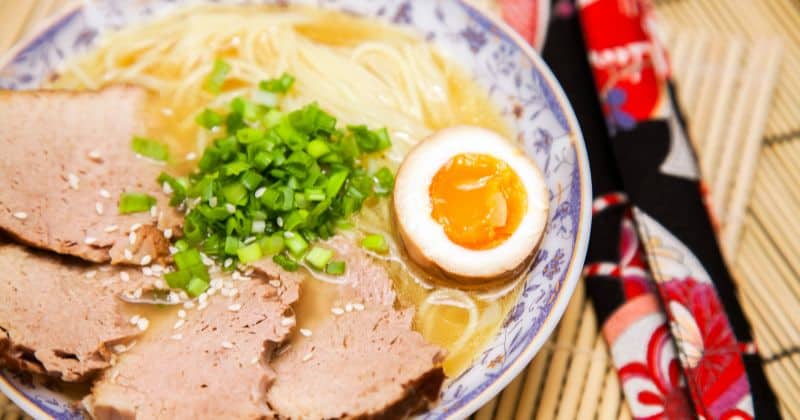Adding an egg to a bowl of ramen may seem simple, but it actually makes a huge difference in texture, flavor, and nutrition. Knowing the right time to add the egg is key to creating the perfect creamy, rich bowl of noodles.
There are three main options for when to add egg to ramen:
- Stir in a raw egg right at the end – This creates ribbons of cooked egg that add a lovely creaminess. The egg imparts flavor to the broth.
- Add a pre-cooked soft-boiled or poached egg on top at serving time – This prevents overcooking but allows the hot broth to warm the egg.
- Cook the egg separately and add it halfway through eating – The heat gently warms the egg without making it tough.
The timing changes the experience, from light egg flavor in the broth to a more pronounced egg creaminess when added at the end. Pre-cooking gives a better texture. So when should you add egg? It depends on if you want rich broth or creamy egg noodles! Read on to learn how to perfectly prepare ramen eggs.
The Many Benefits of Adding Egg to Ramen

Adding an egg to your ramen bowl provides a variety of benefits that enhances the dish. Here are some of the top reasons to crack an egg into your next bowl of ramen:
Extra Protein
A single large egg contains about 6 grams of protein. This is a significant protein boost to a bowl of ramen, which typically only has protein from the few slices of pork or chicken that may be included. The egg makes the meal much more satisfying and nutritious.
Creaminess
The egg adds a lush, creamy texture to the broth, making it feel richer and more indulgent. As the egg cooks in the hot broth, it creates velvety ribbons that coat the noodles.
Flavor
Eggs have a mild and sweet flavor that perfectly complements the salty umami taste of ramen broth. It adds more depth of flavor and gives the broth a more complete taste.
Texture
The egg white lends some extra body to the broth while the runny egg yolk provides a fun burst of creaminess as you slurp up the noodles. This added texture makes the ramen more interesting to eat.
Added Nutrients
Eggs contain important nutrients like vitamin A, selenium, and choline. Adding an egg significantly boosts the nutritional value of a bowl of ramen.
How To Prepare Eggs for Ramen
There are a few different ways to prepare eggs to top your ramen. Here are some of the most popular cooking methods:
Soft-Boiled
Soft-boiled eggs are a classic topping for ramen. To make:
- Place eggs in a pot and cover with cold water by 1 inch. Bring to a boil.
- As soon as the water reaches a boil, remove from heat and cover the pot. Let sit for 6 minutes.
- Shock eggs in an ice bath to stop cooking. Peel eggs.
The whites will be firm while the yolks remain runny.
Poached
For poached eggs:
- Crack an egg into a small bowl.
- In a saucepan, bring 2 inches of water to a bare simmer.
- Gently slip the egg into the water and cook for 2-3 minutes until the whites are set and the yolk is runny.
Scoop out with a slotted spoon.
Hard Boiled
For a fully hard boiled egg:
- Place eggs in a pot and cover with cold water by 1 inch. Bring to a boil.
- As soon as the water reaches a boil, remove from heat and cover the pot. Let sit for 10-12 minutes.
- Shock eggs in an ice bath. Peel eggs and slice in half.
Fried
Frying yields a delicious egg with lacy edges and a jammy yolk:
- Crack an egg into a hot non-stick skillet coated with oil or butter.
- Cook for 1-2 minutes until the edges are lacy and brown.
- Flip and cook for 15-30 seconds on the other side.
When Should You Add Egg to Ramen?

Add Egg Directly to the Broth
Many ramen shops in Japan actually crack a raw egg directly into the hot broth to poach it. This method allows the egg to impart flavor to the broth.
To do this:
- Bring your broth to a simmer in a saucepan.
- Crack an egg and gently slip it into the broth.
- Let cook for 2-3 minutes until the egg white is set but the yolk is still runny.
Add Just Before Serving
You can also prepare your egg separately and add it to the ramen just before eating. This method keeps the egg from overcooking in the hot broth.
For soft boiled or poached eggs, prepare them ahead of time and peel. Place them on top of the noodles just before serving.
For fried eggs, fry them fresh once the rest of the ramen is complete. Slide on top to serve.
Mix in Halfway Through Eating
Some ramen traditionalists prefer to prepare their eggs separately, but then mix them into the piping hot broth halfway through eating. This allows the egg to warm up and impart flavor, but without overcooking.
Creative Ways to Use Eggs in Ramen
While a halved soft boiled egg is the standard, there are all kinds of creative ways to incorporate eggs into ramen. Get inspired with these unique ideas:
Ramen Carbonara
Make a ramen version of carbonara by stirring some beaten raw egg into the hot broth and noodles. It will create a silky sauce.
Egg Drop Soup Ramen
Stir together an egg with some cornstarch and slowly drizzle it into the broth while stirring to create egg drop soup ramen.
Eggy Noodles

For a unique texture, beat some eggs and cook the noodles directly in it, creating eggy noodles. Rinse in cool water and then add to your ramen.
Tea Eggs
Marinate peeled hard boiled eggs in soy sauce, tea, and spices overnight. Slice in half and add to ramen.
Scotch Eggs
Encase peeled hard boiled eggs in sausage or ground pork before breading and frying. Cut in half to top ramen.
Omelet Strips
For a different twist, fry thin omelets and slice into strips as a topping instead of boiled eggs.
Quail Eggs
Use tiny quail eggs as a fun garnish for your ramen.
Tips for Adding Egg to Ramen
Here are some top tips to keep in mind when incorporating egg into your ramen:
- Pay attention to the freshness of your eggs. Very fresh eggs with tight whites work best. Older eggs spread out more in the broth.
- When boiling or poaching eggs, undercook them slightly since they’ll continue cooking in the hot broth.
- Time adding soft boiled or poached eggs so they don’t sit in the broth too long before eating.
- If your ramen has very salty broth, consider using unsalted or low sodium broth when cooking the eggs.
- Adjust cook times based on altitude. Eggs cook faster at higher elevations.
- Don’t stir the broth too much after adding eggs to prevent the whites from shredding apart.
- Add some chilli crisp oil on top of the egg for extra flavor and texture.
Frequently Asked Questions
Does the egg have to be raw when added to the broth?
No, eggs can be prepared separately using soft boil, poach or fry methods and then added later to the cooked ramen. Adding a raw egg directly to the hot broth to cook is traditional but not required.
Is it safe to consume a raw egg in ramen broth?
Consuming raw egg does carry a small risk of salmonella. To reduce risk, it’s important to use the freshest highest quality eggs from reputable sources. Letting the raw egg cook in the hot broth also reduces risk.
Does the egg change the taste of the broth?
Yes, the egg imparts a richness and flavor to the surrounding broth. The yolk also adds body, making it feel more substantial.
Can you prepare the eggs in advance?
Soft boiled and poached eggs can be prepared up to a few days in advance and kept refrigerated. Place them into the hot ramen just before serving.
What’s the best way to peel soft boiled eggs?
Shocking the eggs in ice water post-boiling makes them easier to peel. Start peeling at the wider end, holding the egg under running water can help separate the membrane as well.
For Ramen-Lovers Looking to Take Their Bowls to the Next Level
Adding egg to ramen is an easy way to make the comforting noodle soup even more delicious. With just a couple extra minutes of preparation, eggs lend unique flavor, creaminess, and extra nutrition to ramen. Whether preparing soft boiled, poached, fried, or raw, eggs pair perfectly with those wavy noodles and umami-rich broth. Ramen traditionalists insist on cracking raw eggs directly into the simmering broth for the true authentic experience. However you choose to do it, incorporating egg is an excellent skill in any ramen lover’s repertoire. Master this simple technique and take your ramen obsession to new heights!




